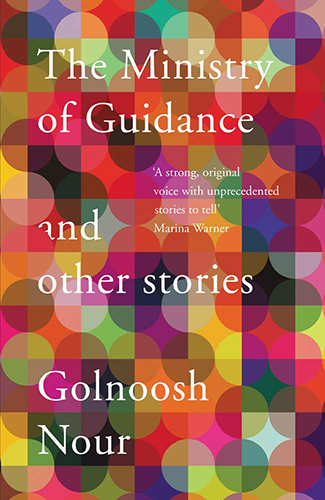

This is a collection of stories about queer Irani people in their twenties. They’re hip, artsy, smart and ambitious; they drink, party, sneak around, fall in love, and fuck. Most of these stories are about a clash between their wants and the reality impeding them (in the form of either social norms or their own self-sabotage).
The book feels very cosmopolitan - not only because the stories take place in exciting big cities in various countries, or because of the numerous references to both Iranian, Western and Eastern (pop) culture, but because that aspect of the book is done with such precision and intentionality.
Nour has spoken about how Iranian books that gain the most acclaim and popularity in the West are the ones that reinforce Western perspectives about Iran - the ideas about abusive men and powerless women - and how she wanted to subvert that narrative. There is an awareness of a Western audience in the book and a sly push back against their expectations (“We’re not living in Marjane Strapi’s comics. Teheran is the most hedonistic city in the world”). Several characters are artists or writers or literature students and the stories are underscored by a meta narrative about art.
There are social dynamics that a lot of us who live in non-English speaking countries affected by American cultural imperialism will recognise: the cool characters pepper their Farsi with English phrases, they admire Western art, and listen to American music, while the uncool characters like Iranian art and traditional music. But there is also a push back against that, an undercurrent of love for Iran and its culture throughout the stories and a resentment for the regime that has hijacked the country; there is the pain of the characters who escape to Europe and are left feeling like they don’t really have a home anywhere, trapped in liminality.
Year of publication:
2020
Country of publication:
UK
Page count:
216
Would I recommend this book?
Yes
But politics aren’t reduced to a black and white narrative either - most of the stories might feature rebellious queer atheists but there are also protagonists who are scared of politics, who stay out of politics, who deal with religious guilt or who are deeply religious and believe in following social norms, granting a well rounded, empathetic perspective.
Some of the stories are gay and lesbian, but the majority are bisexual, mostly about bisexual women, the kind who like Byron and Placebo and a little bit of androgyny. Some date men, some date women, some are in committed relationships and some are casually nonmonogamous.
The prose is quite simplistic, but Nour’s characters and stories are vivid enough to make up for the stylistic weaknesses. I don’t usually like overt political declarations in fiction, but this collection makes it work because political statements are not Nour placing words in her characters’ mouths in order to preach to her readers, they are rooted in the chracters’ emotional reality. For example, an Iranian character bitterly and quietly listening to her white English boyfriend preaching about religion and tolerance thinks to herself:
“I struggle to tell him that he is right [...]. That he knows religion better than I do. That he knows what ‘real’ Islam is and I do not. I, who know the Quran by heart. I, born and raised in the Islamic Republic of Iran. [...] I, who have to celebrate my father’s birthdays on Skype [...]. I, who left all my belongings and friends behind to survive.”
But she doesn’t win the argument, she doesn’t fight back at all, this isn’t a moment of girl power, it’s a quiet moment of realisation that she is alienated from both Iran and England, that the utopia she imagined Europe to be doesn’t exist. The characters who live in Iran are always dreaming of leaving and the characters who have moved to Europe are always dreaming of returning to Iran. Fitting into the overarching theme of liminality, the final story takes place in an airport.
“‘I’m going home.’ The word ‘home’ sticks in my mouth like stale candy.”
